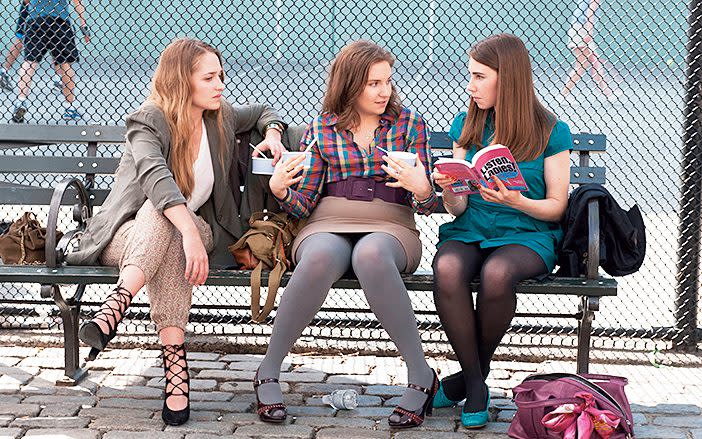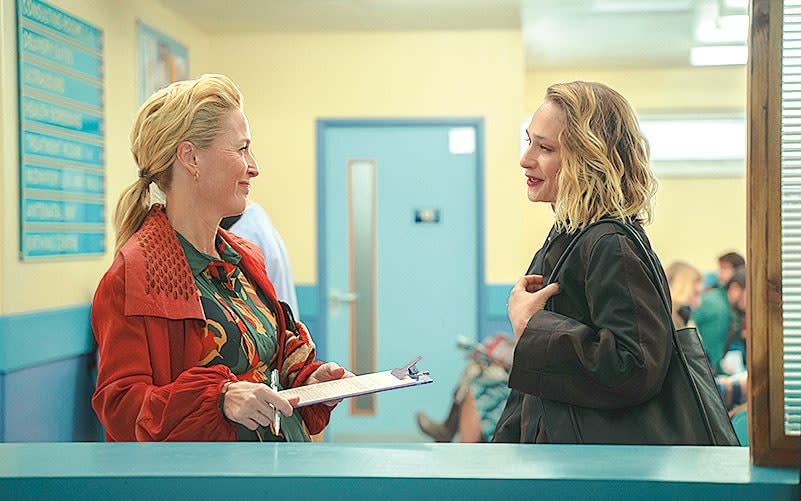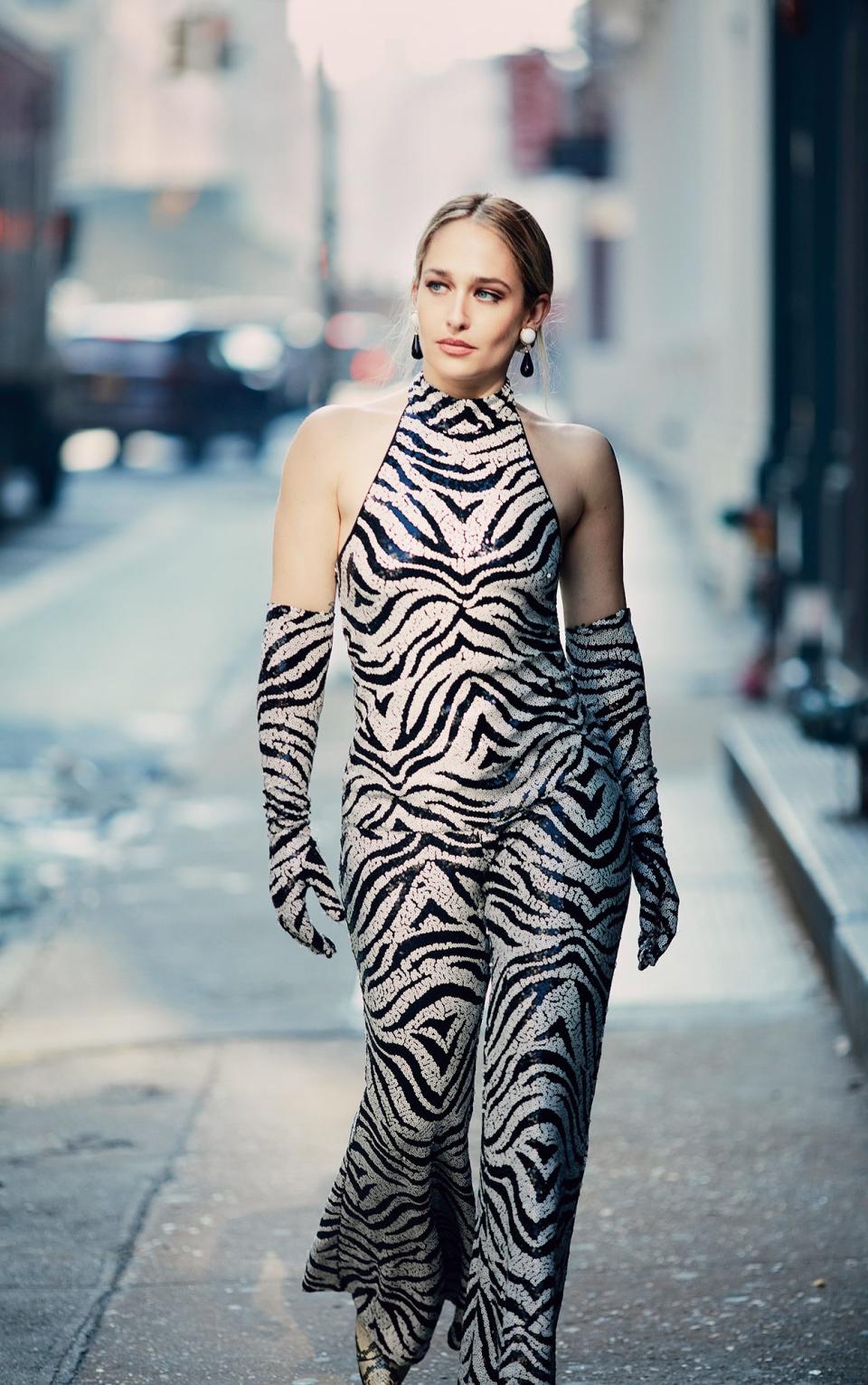Conversations with Friends star Jemima Kirke: ‘I thought, this is marriage written by a 22-year-old’

‘For some reason, everyone seems to think I’m boho,’ says Jemima Kirke, sitting down in a corner booth in the dimly lit Manhattan bistro where we’re meeting for lunch. She’s just come from her Telegraph Magazine photo shoot, which involved Kirke wearing ‘lots of florals and prairie, flowy stuff’.
‘I often end up wearing those kinds of clothes in magazines,’ she says, adding that her personal style is more minimalist. As if to prove her point, she is now dressed simply in a cream wool jumper, baggy black trousers and boots, her dirty-blonde hair spun into a loose bun. Her ears are scattered with mismatched gold studs and hoops; her wrists and fingers covered in finely drawn stick-and-poke tattoos. ‘Maybe it’s because I played a character [who liked those clothes]?’ she muses, scanning the menu. ‘Since when have people presumed that a character you played is who you are?’
The character she’s referencing is Jessa Johansson, the impulsive, chaotic, self-absorbed and, yes, bohemian 20-something Kirke played in Girls, HBO’s era-defining comedy-drama about a quartet of female friends rolling around New York in pursuit of purpose, love and, ultimately, themselves.
The show, which was created by Lena Dunham (who also starred in it), ran for six series from 2012 to 2017 and made an undisputed star of Kirke, who previously had only one significant acting credit (a role in Dunham’s acclaimed 2010 film Tiny Furniture). Not long after Girls debuted, The New Yorker described Kirke as ‘one of the best actresses and stars… on any screen in a very long time’.
Five years on from its conclusion, however, Kirke, 36, is tired of being conflated with a character she has long left behind. Returning home after the final series wrapped was ‘like hitting land’, she explains in her throaty, transatlantic drawl (Kirke was born in London but moved to New York at the age of 10). ‘You just want to cry and fall on the couch,’ she adds. ‘I was ready to move on.’

Today, Kirke is deliberately picky about the work she takes on and tends towards projects with a definitive end date. Much of this is to minimise time spent away from her children, Rafaella, 11, and Memphis, nine, whom she shares with her ex-husband, Michael Mosberg, a former lawyer. The pair live ‘down the street’ from one another in north Brooklyn in order to facilitate their co-parenting arrangement. (Kirke’s house, she says, is ‘extremely colourful, very 1940s’. Her bed is ‘pink, velvet and shell-shaped’.)
‘The kids are the priority and I have to make sacrifices around them,’ she says. ‘You’d think going away for months for a shoot would get easier, but it actually gets worse because I’ve already missed all that time with them and now I’m adding to it.’
This internal battle reared its head when she was first approached to star in Conversations with Friends, the much-anticipated TV adaptation of Sally Rooney’s debut novel. Kirke was sent the script while on set in Wales for the Netflix show Sex Education (she joined in series three as Hope Haddon, the authoritarian new headteacher of the fictional Moordale Secondary School) and didn’t immediately respond. She’d never read the book or watched Normal People, the lusty, wildly successful BBC Three adaptation of Rooney’s second novel, which, on its launch in April 2020, catapulted actors Paul Mescal and Daisy Edgar-Jones to stardom.
‘I was exhausted and hated being away from my kids,’ she says, staring into the distance. ‘I wasn’t in the mood to do any more work so I kept ignoring the email. Finally, I looked at it and said, “I’ll do a Zoom audition once I’m done filming.”’

She was eventually offered the part of Melissa, a haughty yet captivating writer locked in an unfulfilling union with her actor husband, Nick (played by Joe Alwyn). Both in the book and on screen, the plot unfolds from the perspective of Frances (Alison Oliver), a 21-year-old university student who, along with her best friend and former girlfriend Bobbi (Sasha Lane), finds herself unexpectedly involved in the aforementioned marriage.
The series was shot last year from April to October, with much of the filming taking place in locations across Ireland. Did Kirke sit down with Rooney to discuss the author’s vision for Melissa? ‘I’ve never met Sally Rooney,’ she replies crisply. ‘She was never on set, not once.’
At times, she says, she found the role ‘a stretch’. In what way? ‘It’s remarkable that someone of that age [Rooney] has so much discipline and focus, but as I was finally reading the book, I was thinking, “This is marriage written from the perspective of a 22-year-old.” I don’t think that’s good or bad. Her writing is beautiful but there were moments when I struggled to make something work.’
How did she find solutions? ‘I did a lot of writing – stream of consciousness – until I could find a link,’ she says, explaining that she takes a notebook with her on set to jot down thoughts about her character. ‘If I’m playing a wife in a troubled marriage, I won’t think about my own marriage because then I’m putting myself into it and that’s not the job.’
From its early episodes, the series paints a pessimistic view of monogamy. Not only are Nick and Melissa depicted as living separate lives, but Frances and Bobbi scoff at the idea of marriage as something dull and restrictive that only bored, older people embark on. Kirke is currently in a live-in relationship with Australian musician Alex Cameron. In true celebrity style, she instructed her agent to arrange a meeting with him after seeing his music videos, and the pair began dating. Since then, Kirke has directed and starred in several of his offbeat videos. After experiencing both marriage and its dissolution (she met her ex-husband at a rehab centre where they were both receiving treatment, before marrying him in 2009 and separating eight years later), does she share the show’s cynicism when it comes to long-term love?
She narrows her eyes, chewing the question over for a moment. ‘No. But I do think this idea of permanence is old-fashioned,’ she says. ‘Marriage can be something you go through on your journey. You were really in love at that moment and you had a party and a big dress. You committed to each other and that was your intention but life changes and that’s OK. It wasn’t a failure. I’ve had friends getting married who ask, “Do you think I’m making a mistake?”’ She shrugs and laughs. ‘Maybe! But do you really want to get married? Yeah! So do it. I don’t see what the problem is. The perspective of marriage as something super-permanent and spiritual is really antiquated.’
It’s a characteristically considered response from Kirke, who speaks slowly and deliberately as she pieces together sentences that she feels accurately represent her views. It’s not that she’s cautious, rather that she has no interest in following the crowd when it comes to her opinions – or anything else, for that matter.
‘It’s very counterintuitive for me to sit down with a person and pretend to have a conversation but really be performing. I try to be clear with my words because I want to be clear with myself,’ she says, tucking into roast Brussels sprouts and tuna tartare. She’s on day two of a paleo regime, which is part of a bigger attempt to take care of herself after five months of ‘being immersed in the mundane and my job as a mum. It was a guilt move after being away for so long filming and I definitely overdid it,’ she sighs.

Since she first hit the spotlight, Kirke has been branded a wild child by the media. While that may have been the case in earlier years, today she comes across as a homebody (‘I have no problem saying no to events to stay at home with my kids,’ she explains) and somebody deeply in control of her life. She’s engaging and professional but has no truck with niceties. When I ask who she is still in touch with from Girls, she shrugs. ‘Just Lena but I haven’t spoken to her since she got married [to the British-Peruvian musician Luis Felber in September last year].’ The curtness of the reply implies that the cast is no longer close and Kirke has no interest in pretending otherwise.
Born in Westminster to Lorraine, an interior designer who used to run a vintage-clothing boutique in New York’s West Village (it supplied some of Carrie Bradshaw’s outfits in Sex and the City), and Simon, the former drummer of rock bands Free and Bad Company, Kirke comes from an artsy family. It was a loving, creative home (when, aged seven, Kirke showed an interest in painting, her mum turned their wine cellar into an art studio) but, as a teenager, Kirke recalls being left to her own devices. ‘They never spoke to me about sex,’ she says of her parents. ‘I’m not angry about it but issues weren’t always addressed directly. I didn’t have someone guiding me on those things.’
She plans to correct this with her own children. ‘I try to bring them [difficult subjects] up when there’s an opportunity. So when I hear something or see a behaviour I’m worried about, I use it as an opportunity to insert some of my beliefs. But not too much. That’s how you f—k up your kids – you give them your beliefs and they don’t have their own.’
Kirke’s maternal grandfather was the banker turned billionaire property tycoon Jack Dellal, famous for his love of gambling and flipping properties at speed (in 1987 he bought London’s Bush House for £55 million; he sold it two years later for £130 million). Her cousins include shoe designer Charlotte Olympia Dellal and model Alice Dellal (whom Kirke counts as one of her best friends), and she has two sisters – Lola, an actor and ‘country musician’, for whom Kirke has directed music videos (they also played sisters in the 2019 film Untogether), and Domino, a Brooklyn-based singer, actor and doula who was hired by comedian Amy Schumer when she was pregnant.
Not long after the Kirke brood upped sticks to Manhattan, Jemima started at the liberal Saint Ann’s School in Brooklyn where, as well as befriending Dunham, she was close to the model and Boardwalk Empire actor Paz de la Huerta. The pair shunned school social events, preferring to hang out in tattoo parlours and, when they could blag their way in, bars. ‘This actually used to be a cool spot in the early 2000s,’ she chuckles, gazing around the restaurant. ‘It was where we came to drink at the start or end of the night.’
She went on to study fine art at the prestigious Rhode Island School of Design, but was suspended for missing classes. It was after graduation that she finally honed her focus, producing a series of watercolour portraits (predominantly of women she knew) that drew comparisons to American painter Alice Neel. But recently painting has tumbled down her list of priorities. ‘I haven’t really done it in the past two years because of all the jobs,’ she says wistfully. ‘I really miss it.’

Kirke has been very open about her earlier life experiences, from going to rehab at 19 to being raped by a drug dealer in her early 20s (something she only made public in 2018, after Christine Blasey Ford’s testimony against then US Supreme Court nominee Brett Kavanaugh).
Around this time, she became pregnant by her then boyfriend and sought an abortion. In order to afford the procedure, she refused anaesthesia. She later recounted the story for a campaign by the Center for Reproductive Rights.
A couple of years ago, she posted a photo on Instagram to mark Mother’s Day, thanking her children’s nanny. ‘I can’t stand playing with children so you’ve saved them and me a whole lot of boredom,’ the caption read. ‘I got so much shit for that,’ she says. She’s referring to a flurry of comments that branded her admission – and approach to parenting – ‘sad’ and ‘shameful’ (there were also positive comments praising her candour). ‘I think it’s because she [Kirke’s nanny] is black. I was thanking her for doing everything I can’t do and that references a specific role that slave women had to do as caregivers. I get it. I understand.’
Kirke did win major family plaudits when she FaceTimed her daughter from the set of Conversations with Friends with Alwyn and his girlfriend, Taylor Swift. ‘I was having drinks with Taylor and I told her my daughter is a fan and she said, “Why don’t we call her?” I said, “I don’t know if we can cold-call my daughter. She might die!” But we did and she just started sobbing. I felt bad and she texted a few minutes later saying, “Can we try again?” She was crying and laughing and covering her face. She didn’t know what to do.’
We return to the subject of social media and how Kirke decides what to post. The mark of ‘an intelligent man’, she says, paraphrasing F Scott Fitzgerald, is the ability to ‘hold on to two opposing ideas at the same time and still function’. It’s a philosophy that she fears we’re losing sight of in our internet, cancel-culture age. ‘I don’t think you’re obligated to commit to a point of view or role,’ she says. I ask whether she considers herself British or American. ‘I don’t identify as anything,’ she replies. ‘I don’t feel straight, I don’t feel gay.’ She pauses and rethinks. ‘I guess I identify as a woman and an artist and a mother. Just the fundamentals.’

For all of her progressive thinking, she isn’t sure what she makes of some of the changes that have occurred in the entertainment industry in the wake of the MeToo movement. Many shows, including Sex Education, now have on-set intimacy coordinators to support actors filming sex scenes. For Kirke, this is a complex development. ‘I haven’t worked with one yet but what I love about this,’ she says, leaning forward animatedly, ‘is that they choreograph it [the scene]. Back when I was doing sex scenes [in Girls], they weren’t as directed as conversational scenes. You always felt a bit lost– not lost maybe, close to home – I don’t know. I can totally understand how some people could be uncomfortable with that, but I wasn’t. It was more exciting to me – not necessarily sexual or a turn-on, but I was curious to know what it would be like to be naked and doing these actions in front of the sound guy and all these different people.’
She wonders whether the quest to make everyone on a set feel comfortable risks compromising the spark of a project. ‘Things are much more sanitised and everyone is protecting their arses,’ she says wearily. ‘My view is that you don’t always have to be comfortable on a movie set as an actor. I don’t know where to draw the line but it’s definitely a blurry one. [As an actor] you’re supposed to be present in your emotions in that moment… I think maybe we are making discomfort into a negative thing.’
Alongside its ardent millennial following, Girls had its fair share of detractors, whose criticisms ranged from the reasonable (the show’s central cast was almost exclusively white) to the ridiculous (a woman of Dunham’s body type should not be allowed to take her clothes off on screen). How would the series be received if it debuted in the current social climate?
‘It would definitely get grief,’ she says. ‘I think Lena made something without fear and she wouldn’t be able to make that today. She would be too scared.’
Earlier this year, Dunham remarked that she could envisage a Girls reboot happening at some point. Would Kirke sign on? ‘Yeah!’ she replies before lowering her voice. ‘For the right amount of money.’ Where would she want us to find Jessa? ‘I don’t want to give anyone another opportunity to equate me with her, but I wouldn’t be surprised if she had a couple of kids, maybe from two different dads. Maybe she’d be raising them on her own with a nanny who she insists on referring to as her personal assistant.’
And with that, Kirke stands up, throws on her coat and explains that she needs to go home to ‘meet the housekeeper’. In a matter of seconds, she is gone. She may not enjoy the comparisons to Jessa but she does share one undeniable trait with her on-screen alter ego: a single-minded resolve to do and say whatever she wants without worrying what anyone else thinks – even for a second.
Conversations with Friends airs on BBC Three on Sunday 15 May, with all episodes available on BBC iPlayer that day


